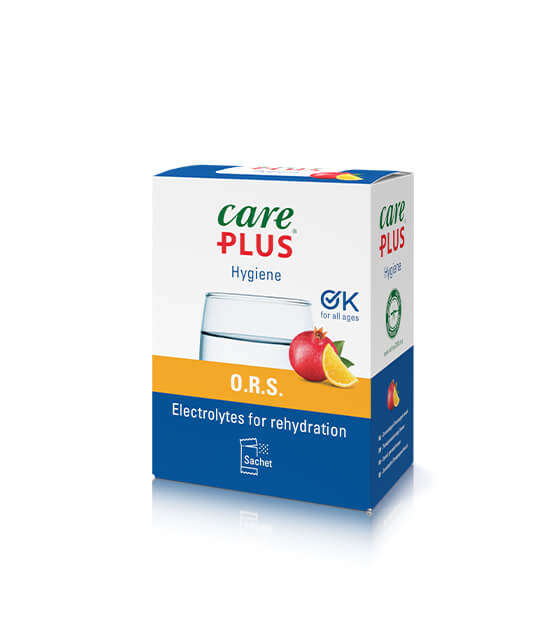What is dehydration?
Ninety percent of the human body consists of water. A certain amount of fluids are necessary for the proper functioning of your body. An adult body has a daily requirement of 2 litres (6-8 glasses per day). With insufficient fluid intake and/or excessive fluid loss, dehydration can occur. Especially the elderly, pregnant women and babies are at risk of dehydration.
Cause of dehydration
Upon dehydration, the body loses more fluid than it takes in. We lose fluid while breathing, sweating, urinating and during bowel movements. Along with fluids, also salts, proteins and sugars that the body needs disappear. Loss of too many fluids and salts can cause dehydration. This can have different causes:
- A gastrointestinal infection, with vomiting and/or diarrhoea.
- Very high fever.
- Major loss of blood.
- Severe perspiration, due to extreme heat or certain medication use.
Symptoms of dehydration
Dehydration symptoms occur in case of a serious decrease in fluid level. You can feel weak and suffer from headache, dizziness and nausea. You also stop urinating and you are thirsty. In severe cases, you may experience the following symptoms:
- A fast or a weak pulse.
- Vascular and muscle cramps.
- Loss of voice.
- Sunken eyes.
- Loss of consciousness.
If dehydration is not treated in time, it can lead to shock. Blood pressure will drop dangerously low and the heart will beat irregularly. There can also be damage to the brain, heart and kidneys, and eventually can result in death. However, if dehydration is treated on time, the prospects are good.
What to do in the event of dehydration?
Make sure that you have ORS within reach. A combination of the right amounts of salts and glucose increases the absorption of water when your body fluid levels are out of balance. This glucose-salt preparation has a pomegranate/orange flavour and is suitable for all ages. The formulation is in accordance with the World Health Organization (WHO).
O.R.S.
After strenuous exercise or illness, a significant amount of fluids can be lost. A combination of the right quantities of salts and sugars increases the absorbtion of water during physical exercise. A glucose-salt preparation such as Care Plus® O.R.S. increases the intake of water during physical exercise.
Care Plus® O.R.S. is suitable for all ages and is available in a fresh orange flavour and a sweet raspberry flavour. Our Oral Rehydration Salts (O.R.S.) should be part of every medicine kit.
Dehydration due to diarrhoea
There is also a risk of dehydration with diarrhoea. Drinking only water, broth and tea won’t help. In case of diarrhoea, this is not absorbed by the body because the intestines cannot absorb it. ORS ensures that the fluids can get through the intestinal wall and be absorbed by the body.
When you travel to a (sub)tropical country, there are extra measures you can take to prevent the risk of diarrhoea:
- In (sub)tropical countries, only use water that you have previously boiled or purified. This also applies when brushing your teeth. Bottled water from the factory is usually safe: Make sure that the bottle has not been previously opened when you buy the bottle.
- Wash your hands with soap and water after using the toilet and/or use disinfectant hand gel.
- Wash your hands with soap and water and/or use disinfectant hand gel before every meal, and when preparing food or drinks.
- After washing your hands, dry your hands thoroughly with a clean towel or disposable paper towels.
- Make sure plates and cutlery are clean. Cups and glasses must also be clean and not have a funny smell.
- Remember that bath water can also be contaminated. Make sure that you do not ingest or swallow swimming water through your mouth or nose. This certainly applies to children.
- Do not use uncooked milk, ice cubes and ice cream. Ice from factory packaging is safe.
- Only drink products from factory packaging (bottles, cans or cartons).
- Do not eat uncooked vegetables or unpeeled fruit. Peeling and cooking yourself is best.
- Ensure that meat, fish, chicken, shellfish and crustaceans have been well heated.
Dehydration in babies
A large risk group for dehydration are babies, young children and the elderly. The symptoms that may indicate body dehydration vary. Dehydration in babies can be recognised by:
- Dark yellow urine.
- Little energy.
- Dry mouth, lips and skin.
- No tears when crying.
- Deep-set eyes and fontanelles.
If the dehydration becomes very severe, the baby’s urine may smell like fish and contain urea crystals.
Dehydration in the elderly
In elderly people, the cause of dehydration is often a low fluid intake and impaired kidney function.
The symptoms that indicate dehydration in the elderly are:
- Dry mouth, lips and skin.
- Grooves in the tongue.
- Speech problems.
- Confusion.
- Decreased muscle strength.


